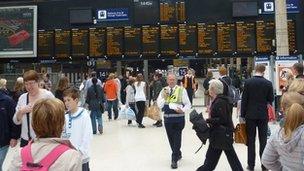Scotland's population climbs to record level
- Published

The Scottish population is getting older
The number of people living in Scotland has reached a new high, according to the latest official figures.
At the end of June last year the population stood at 5,313,600 - up 18,200 since the last census on 27 March 2011.
Although there were more births than deaths, the rise was mainly due to people moving into Scotland.
Women continue to outnumber men in Scotland, with nearly 160,000 more females.
The figures also revealed, external that, since the 2001 census, Scotland's population had become older.
There were rises of 14% in those aged 75 and over, 16% in the 60 to 74 age group, and 14% among those aged 45 to 59.
Among younger people, there were falls of 6% in the under-16 age group, and 9% in those aged 30 to 44.
Male mortality
Overall there were 159,320 more women in Scotland than men last year, widening the gender gap which had been evident in previous census data.
The report said: "Among older people, particularly those aged over 75, the higher number of females reflects the longer expectation of life for women, partly as a result of higher rates of male mortality during the Second World War.
"The two baby booms of 1947 and the 1960s can also be seen, with a sharp peak at age 65 and another peak between the ages of around 40 and 50.
"These baby boomers, along with relatively low fertility rates since the 1960s, are the main reasons why Scotland's population is likely to age in the future."
Scottish government minister Fiona Hyslop accepted there was an ageing population and said it was "excellent" to see the under-fives population had increased by 3,050 since the 2011 census.
She added: "The net in-flow of 14,300 more people coming to Scotland from overseas than leaving is proof that Scotland is an attractive and dynamic nation and one where people want to make a life for themselves.
"The Scottish government welcomes the contribution these new Scots can make to our economy and society, and we are working hard to attract the best international talent to our universities and our workforce."
After publication of the figures, the Scottish Conservative Party expressed concern that the population was now growing at a much slower rate.
Finance spokesman Gavin Brown said: "A country like ours needs people, particularly young people, to come in to work and increase the tax base - that is absolutely essential for the economy.
"It could just be a one-year blip, but the minister in charge at the Scottish government needs to find out why this is and what can be done, and explain as quickly as possible what the solution will be."
- Published17 December 2012
- Published17 December 2012